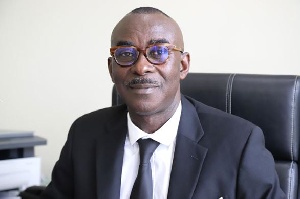- Home - News
- Elections 2024
- News Archive
- Crime & Punishment
- Politics
- Regional
- Editorial
- Health
- Ghanaians Abroad
- Tabloid
- Africa
- Religion
- Photo Archives
- Press Release
General News of Friday, 23 May 2025
Source: www.ghanawebbers.com
'We need a law to stop abuse of mineral royalties' - Chamber of Mines boss
Ahmed Nantogmah, the Acting Chief Executive of the Ghana Chamber of Mines, is calling for a law. This law would regulate how mineral royalties are used in local communities.
He believes that without this legal framework, mining communities will remain underdeveloped. These communities generate significant revenue from mining operations.
Speaking on JoyNews’ PM Express Business Edition, he stated, “We need an act or a law to regulate mineral royalties.” He emphasized that the real issue is not just mining companies but also how local authorities misuse these funds.
Nantogmah pointed out that many mining companies contribute to community development. He noted that schools and hospitals in some areas are funded by these companies.
He questioned why local assemblies receiving royalties still ask companies for help with basic infrastructure. For example, if there’s a road needing repair, why would an assembly ask Gold Fields for assistance?
He mentioned that Gold Fields built over 33 kilometers of road for one community. This work should have been funded through mineral royalties already received.
“We are saying that’s why we need a law,” he added. He compared it to existing laws in petroleum revenue management and suggested creating one for mining revenues.
Nantogmah proposed a mineral revenue law to define specific uses for royalties. For instance, if the law states they can only be used for health and education, then they must be used accordingly.
He expressed concern about whether royalty returns to towns like Obuasi are properly utilized. “Obuasi has a mining company; many royalties should come back,” he said.
However, he questioned their actual return and usage. The lack of transparency and accountability undermines development in these areas.
He stressed that questions about development should also apply to local authorities managing these funds. The state cannot expect mining companies to handle planning and development tasks meant for local governance.
“If the town is not properly planned, it’s not the job of the mining company,” he explained. He referenced a study showing about 80% of mineral benefits stay in Accra while developing other parts of Ghana.
“Ghana is developing on the back of mining,” he noted. However, focusing solely on local communities may overlook broader issues with responsibility for development.
Nantogmah called for national discussions on royalty amounts and their distribution. He believes it’s essential to tie revenue to specific projects for better accountability and effectiveness.











